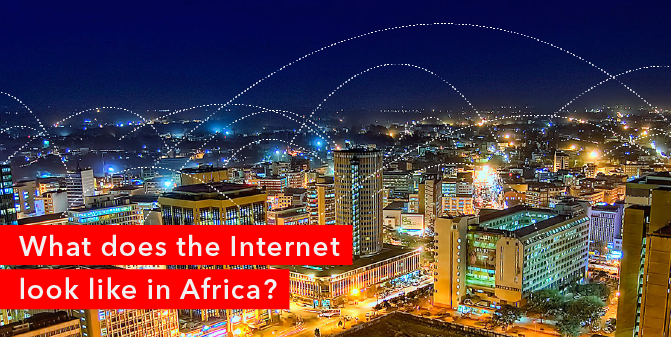What does the Internet look like in Africa?
It is estimated that currently only about 30% of Africa is connected to the Internet. Getting a home or work Internet connection for your PC is difficult for most people due to the poor infrastructure available in the urban areas and the lack of cabling in the more remote areas.
If someone is lucky enough to have an Ethernet or Wi-Fi connection it is usually slow, has unreliable service and is expensive. But Africa does have one of the highest mobile penetration rates in the world. So while many people do not have desktop access to the Internet, the majority do have access to a mobile phone.
Now mobile network operators across Africa are starting to introduce more affordable smartphones into the market to try increase the number of people who have access to the Internet. But this brings with it its own barriers, as the cost of mobile data is still high in most countries. It is also evident that many people who have a smartphone will avoid using their 3G connectivity and only connect to the Internet when they are in free Wi-Fi areas. This has led to higher demand for free Wi-Fi access in cities across Africa, and companies like Google have the potential to make a big impact with the likes of Project Loon.
These are just some of the issues affecting Internet connectivity across the African continent. However, despite these challenges many African countries are making progress and creating thriving digital and tech hubs in their cities.
We take a look at three African countries that are making significant headway in getting connected:
Ghana
Ghana has one of the most active mobile markets in Africa. This opened the door for mobile broadband services which currently account for the majority of Internet connections within the country.
Ghana was one of the first African countries to be connected to the Internet and between 2012 and 2013, fibre-optic cables were laid, paving the way for increased international bandwidth which has transformed the country’s broadband market.
According to the Internet World Statistics 29.6% of Ghana’s population use the Internet, as of June 2016. This accounts for 2.4% of Internet use in Africa.
This growing connectivity in Ghana has allowed the tech industry to boom, not only by giving people access to information but also enabling the development of a number of tech startups and businesses that are flourishing. You can read about some of the top tech hubs and incubators in Ghana here.
Kenya
The mobile market in Kenya continues to grow steadily with approximately 40 million mobile subscribers recorded in early 2016. The introduction of four fibre-optic cables into the country has provided a greater percentage of the population access to the Internet.
According to the Internet World Statistics 69.6% of Kenya’s population use the Internet, as of June 2016. This accounts for 9,7% of the Internet use in Africa.
Kenya based company BRCK is one example of a business that is working towards connecting people to the Internet by creating Internet connectivity products for Africa. The BRCK is a product that was created as a self-powered mobile Wi-Fi device that connects people and things to the Internet in areas with poor infrastructure.
During the Net Prophet 2016 conference earlier this year BRCK CEO, Erik Hersman, spoke about the complex problems involved with getting the African continent connected to the Internet. He posed the question, “Why doesn’t the Internet work for Africans right now?” His answer to this was, “It’s expensive, which is the biggest blocker, once they get it and pay for it, it’s actually slow and then unreliable, they can’t actually get it constantly.”
Erik goes on to say that if you want to win the battle of the Internet in Africa; “The ground game is the most important thing in Africa and it’s the hardest thing.”
You can watch Erik’s full talk from Net Prophet 2016 here.
Despite these challenges, Nairobi, Kenya’s capital city, is becoming one of Africa’s hottest tech markets with many large global technology companies setting up research and innovation hubs there.
Nigeria
Nigeria has the largest mobile market in Africa with over 148 million subscribers. With the ever-increasing demand for bandwidth, network operators are having to invest billions of dollars on fibre-optic infrastructure to deal with the network congestion.
According to the Internet World Statistics 51.1% of Nigeria’s population use the Internet, as of June 2016. This accounts for 28% of the Internet use in Africa.
Nigeria has managed to reduce the cost of international bandwidth by up to 90% and improved domestic fibre cabling has contributed to the reduced cost of broadband services to its customers. In early 2015 the Nigerian government committed to increasing broadband penetration from around 8% to 36% by 2018.
This expansion of the national fibre networks has opened the door for the development of many applications such as e-commerce, online banking, e-health, e-learning and e-government.
Nigeria is home to some amazing tech entrepreneurs who are doing interesting things in the African digital space. This includes everything from getting the right infrastructure put in place in order to access the Internet, creating systems for online banking and payment processing, to booking a hotel or travel online and even gaming. You can read about the top 21 Nigerian tech CEO’s here.
Africa remains an exciting place, full of potential for technological innovation. While it may still have a long road ahead to reach the kind of connectivity seen in the developed Western world that simply means there are more opportunities for tech startups and entrepreneurs and many exciting developments to come.







